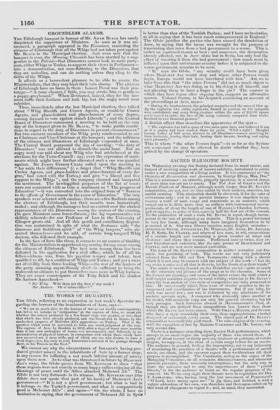THE WORKS OF HUMANITY.
THE Globe, referring to an expression in last week's Spectator re- garding the horrors of the bombardment of Acre, says- " We are as roue!' alive to the horrors of war as our weekly contemporary; hut, bef,re we indulge in ' indignation' at the capture of Acre, we must ask whether the misery produced by a few hours' siege was greater, or less, than that which has been already produced, and was threatened in future, by the unchecked progress of Mehemet Al's aggressions on Turkey. That is the question which must be answered, to form any moral judgment of the eaSe. The capture of Acre by Ibrahim in 1832, after a siege of many more months than it has now undergone of hours, was accompanied, and followed, by an accumulation of physical horrors, in comparison with which those which have now occurred are a mere trifle, and of which any one who desires to have a vivid impression, has only to read Lamartine's account of his passage through Acre, in his Travels in the East."
We cannot see why the circumstance of Innmarm's having pro- duced greater misery to the inhabitants of :\ ere by a former siege, is any reason for inflicting a not much inferior amount of misery upon them Dow. As to what was threatened in future by MEHEMET 'Am's sway, the Globe quotes from Mr. KINNEAR to show " that these regions were not exactly so many happy vallies enjoying all the blessings of peace until the Allies attacked Mehemet Ali." The Globe is not very fortunate in its witness. Mr. KINNEAR Says (the Globe does not quote that part of' his book) of' MEHEMET Aim's Fovernment—" It is not a good government ; but what is bad in it belongs to the Turkish government, and what is comparatively good is Mehemet Ali's" : and again—" On the whole, I have no hesitation in saying, that time government of Mehemet All in Syria is better than that of the Turkish Pashas; and I have no hesitation at all in saying that it has been much misrepresented in England." The Globe justifies the parties who have caused the desolation of Acre, by saying that the havoc was wrought for the purpose of transferring that town from a bad government to a worse. This is rather an equivocal reason at best ; and moreover, the devastation already effected, not in Acre alone but in Syria, has only had the effect of wresting it from the bad government : how much Must be inflicted upon that unffirtunate country before it is subjected to the worse government, remains to be seen, " If," says the Globe, " any security could have been given whore MEHEMET Ai I would stop and where other Powers would bec,:in, Europe would not have interfered with him." Are Nye to inter from this that "time other Powers" did not so much object to what Mamma' ALI was doing, as to his doing it all himself, and not allowing them to have a finger in the pie ? The manner in which they have begun after stopping him, suggests an affirmative answer. Colonel SMITH', in his despatch containing an account of the proceedings at Acre, says- " During the bombardment, the principal mnf,eazine and the arsenal blew up. By the explosicm two entire regiments, formed in position on the ramparts, were annihilated, and every living creature within the area of 69,!100 square yards ceased to exist; the loss of' life being variously computed from twelve hundred to two thousand persons."
A British officer thus describes the appearance of the spot-
" The explosion has laid a space of two acres quite bare, and hollowed it out as if a quarry had been Ivorked there for years. 'What a sight ! Mangled human bodies of both sexes, strewed in all directions—women searching for their husbands, tearing their hair, beating their breasts, howlidg mid crying most piteously."
This is where "the other Powers begin"—in so far as the Syrians are concerned we may be allowed to doubt whether they have gained by the change of operators.


























 Previous page
Previous page